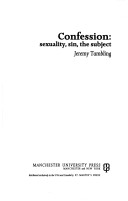Cultural Politics
1 total work
Has Western man, to quote Foucault, become a confessing animal? Drawing on new critical theory, deconstruction and psychoanalysis, this study argues that the impulse to confess produces people as subjects with the need to narrate and lay bare the secrets of their lives and to define themselves in relation...Read more
Has Western man, to quote Foucault, become a confessing animal? Drawing on new critical theory, deconstruction and psychoanalysis, this study argues that the impulse to confess produces people as subjects with the need to narrate and lay bare the secrets of their lives and to define themselves in relation to their sexuality and to a presumed norm. The book surveys confessional practices running through Western societies, such as the church and the police, and examines confessional literature, taking in such writers as Augustine, Rousseau, Dostoyevsky, Mann, Nietzsche, Sartre and Genet. There are sections on medieval confession, on the early modern period and on Romanticism. Literature is seen as inherently confessional, constructing the author as marked out by a deep personal subjectivity. Tambling looks at possible resistances to confession, including self-fashioning and the production of the postmodernist self. He further asks about the relationship of confession to the strategies of power and control in modern society.
This book should be of interest not only to literature students, but also historians, sociologists and those engaged in investigating cultural practices and their ideological impact.
This book should be of interest not only to literature students, but also historians, sociologists and those engaged in investigating cultural practices and their ideological impact.
